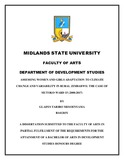Please use this identifier to cite or link to this item:
https://cris.library.msu.ac.zw//handle/11408/3992Full metadata record
| DC Field | Value | Language |
|---|---|---|
| dc.contributor.author | Mesoenyama, Gladys Tariro | - |
| dc.date.accessioned | 2020-12-09T09:04:38Z | - |
| dc.date.available | 2020-12-09T09:04:38Z | - |
| dc.date.issued | 2017 | - |
| dc.identifier.uri | http://hdl.handle.net/11408/3992 | - |
| dc.description.abstract | This study assesses women and girls adaptation to climate change and variability. It identifies the impacts of climate change on women and girls and the reasons why they are more vulnerable as compared to their male counterparts. The study also identifies the adaptation strategies being employed by rural women and girls in trying to cope with the impacts of climate change and the extent to which these adaptation strategies have been successful. The research was centered in Mutoko ward 15. In trying to gather information the researcher made use of structured questionnaires, interviews, focus group discussions and direct observations. The researcher found out that women and girls are more exposed to the impacts of climate change because of their gender constructed roles. The researcher found out that women and girls in ward 15 were exposed to the impacts of climate change which included sexual exploitation, scarcity of water and energy sources and food insecurity. They are exposed to such impacts because they do not have access to and control over resources; they lack information about climate change, they are not educated and lack participation in decision making on issues which affects them like climate change. In trying to adapt to climate change, women and girls in ward 15 have employed various adaptation strategies. Some of the adaptation strategies which they are employing include irrigation, growing drought resistant crops, borehole drilling, and migration and off farm activities. However, the research found out that these adaptation strategies have not been effective. This is due to the fact that they do not have access to money or means of production, they also do not have control over resources and land and also they lack the decision making power in the society. It is in this light that the research makes various recommendations towards the empowerment of women so that they can participate in the decision making process of the issues that affect them. | en_US |
| dc.language.iso | en | en_US |
| dc.publisher | Midlands State University | en_US |
| dc.subject | women and girls adaptation | en_US |
| dc.subject | climate change | en_US |
| dc.title | Assessing women and girls adaptation to climate change and variability in rural Zimbabwe : a case of Mutoko ward 15 (2000-20017) | en_US |
| dc.type | Thesis | en_US |
| item.languageiso639-1 | en | - |
| item.grantfulltext | open | - |
| item.fulltext | With Fulltext | - |
| item.openairetype | Thesis | - |
| item.openairecristype | http://purl.org/coar/resource_type/c_18cf | - |
| item.cerifentitytype | Publications | - |
| Appears in Collections: | Bachelor Of Arts In Development Studies Honours Degree | |
Files in This Item:
| File | Description | Size | Format | |
|---|---|---|---|---|
| gladys_mesoenyama_final_dissertation_for_submission[1].pdf | Full Text | 737.57 kB | Adobe PDF |  View/Open |
Page view(s)
282
checked on Feb 3, 2026
Download(s)
200
checked on Feb 3, 2026
Google ScholarTM
Check
Items in MSUIR are protected by copyright, with all rights reserved, unless otherwise indicated.



